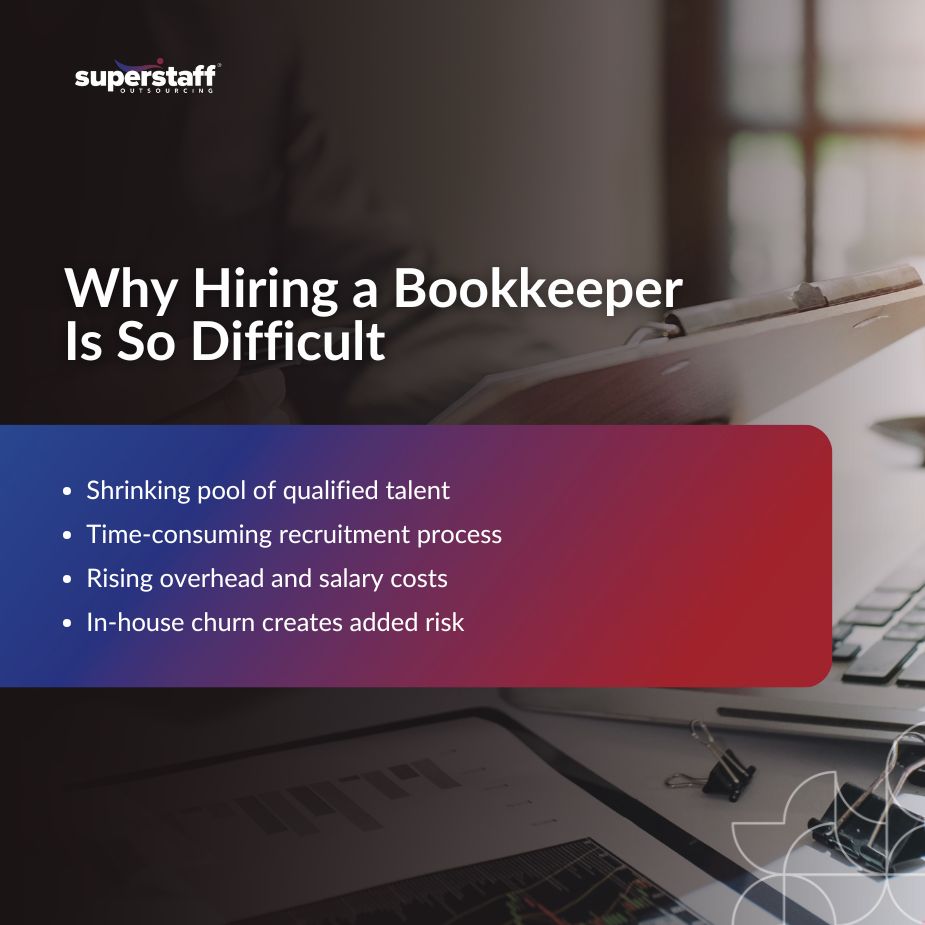
Hiring a bookkeeper isn’t as easy as it used to be.
Once considered a straightforward back-office role, bookkeeping has become one of the most difficult positions to fill—especially for small and midmarket businesses trying to stay agile in a competitive landscape. The demand for finance professionals has surged, but the talent pipeline hasn’t kept up. Business owners are finding themselves in a bind, trying to maintain financial accuracy without the in-house expertise they need.
This blog unpacks the current difficulties in hiring a bookkeeper, examines why the bookkeeper hiring process is more complex than ever, and explores why outsourcing could be the strategic move your business needs.
Bookkeeping Roles Are Harder to Fill Than Ever Before

Across the United States and other global markets, companies are discovering that hiring a bookkeeper has become an uphill battle. What used to take a few weeks is now dragging into months, and the talent pool continues to shrink.
Part of the issue is demographic. A large portion of the current bookkeeping workforce is approaching retirement age. At the same time, fewer young professionals are entering the field. Enrollments in accounting and bookkeeping-related programs have declined steadily over the past decade, creating a vacuum that businesses now struggle to fill.
The remaining talent is stretched thin. High turnover and burnout—especially within small finance departments—mean that even when businesses manage to hire a bookkeeper, keeping them is another challenge altogether. Many regions report limited availability of experienced professionals, pushing companies to compete for the same small group of candidates.
Hiring a bookkeeper locally has become an expensive, time-consuming process with no guaranteed payoff. But the challenges don’t stop there.
Recruiting and Retaining Bookkeeping Staff Drains Resources
Beyond finding someone qualified, the entire bookkeeper hiring process takes a significant toll on internal resources. Writing job descriptions, sifting through resumes, conducting interviews, checking credentials, onboarding—every step takes time. And time is money.
Businesses often underestimate the time and effort required to recruit a reliable bookkeeper. Onboarding alone can take several weeks, especially if the new hire needs training in proprietary systems or compliance protocols. That doesn’t include the time spent managing recruitment ads, conducting background checks, or adjusting workflows to accommodate new team members.
Then there’s compensation. Competitive candidates today expect higher salaries and more generous benefits packages. On top of that, companies must offer flexible work arrangements, invest in training programs, and maintain engagement to prevent churn.
Hiring a bookkeeper also involves risk. A bad hire can lead to costly errors, regulatory compliance issues, or simply wasted time if the relationship doesn’t work out. These risks are amplified for fast-growing businesses or those with limited HR support.
It’s no wonder many leaders are rethinking the traditional hiring model altogether.
The Cost of In-House Bookkeeping Can Outweigh Its Benefits
When evaluating the real cost of hiring a bookkeeper, salary is just the beginning. Full-time staff come with a host of overhead costs that can quickly add up, especially for smaller businesses trying to maximize every dollar.
First, there’s infrastructure. Bookkeeping professionals need secure workstations, licensed software, and access to up-to-date financial tools. These requirements demand investments in IT, cybersecurity, and system integration. Then come the ongoing operational costs—payroll taxes, healthcare contributions, performance incentives, and administrative support.
Even the hiring process itself involves hidden costs. From recruiter fees to lost productivity during transitions, these expenses often go untracked on the balance sheet but are deeply felt in the day-to-day operations.
For many SMEs, this traditional hiring model is no longer sustainable. Keeping finance roles in-house can limit flexibility and divert resources away from growth opportunities. That’s why outsourcing is no longer just an option—it’s a competitive necessity.
Outsourcing Bookkeeping Offers a Practical Solution to the Hiring Crunch
More business leaders are realizing that hiring a bookkeeper doesn’t have to mean hiring in-house. Outsourcing bookkeeping functions to offshore teams is emerging as a smart, strategic way to bypass the bottlenecks and access top-tier financial expertise without the hassle.
Through outsourcing, businesses gain immediate access to trained professionals skilled in everything from accounts payable and receivable to reconciliation, reporting, and compliance support. These professionals are already proficient in the platforms and accounting standards relevant to U.S. and international markets.
What makes this solution even more attractive is scalability. Whether you’re a startup experiencing rapid growth or a midmarket company navigating seasonal spikes, outsourced bookkeeping teams can flex with your needs. That means you get exactly the level of support required—no more, no less.
And then there’s the cost advantage. By outsourcing, you eliminate the bulk of infrastructure expenses. Your outsourced team comes equipped with the tools, licenses, and expertise needed to hit the ground running, without burdening your internal operations.
Outsourced Bookkeeping Improves Accuracy, Efficiency, and Strategic Focus
Outsourcing isn’t just about saving money—it’s about making your finance function more strategic. By offloading routine financial tasks, your internal team can shift its focus to high-impact areas like forecasting, planning, and strategic growth.
The quality of output improves, too. Outsourced bookkeeping providers rely on standardized processes, built-in quality assurance, and advanced tech integrations to reduce human error and increase visibility. With access to 24/7 support, your business can keep moving forward—no matter the time zone.
Some providers even offer integration with business intelligence tools, giving you real-time access to performance dashboards, analytics, and actionable insights. This transforms your financial operations from reactive to proactive—helping you make data-driven decisions faster.
In short, outsourcing enhances your agility. And in today’s competitive climate, agility is the name of the game.
Choosing the Right Partner Makes All the Difference
Still, not all outsourcing solutions are created equal. To make the most of the shift, you need to partner with a provider that understands your industry, your tools, and your goals.
When hiring a bookkeeper through an outsourcing partner, look closely at their certifications, data security policies, and tech stack. Do they offer end-to-end support or just task-based execution? Are they experienced in U.S. accounting standards and familiar with platforms like QuickBooks, Xero, or NetSuite?
Also evaluate their onboarding process. A strong outsourcing provider should offer seamless integration with your internal workflows, along with ongoing reporting and real-time communication. This ensures transparency and accountability—two things no business can afford to compromise.
Lastly, ensure the partner understands your business context. Whether you’re in e-commerce, healthcare, SaaS, or logistics, industry knowledge adds significant value and reduces the learning curve.
The decision to outsource should not be seen as a stopgap—it’s a long-term move toward operational excellence.
Conclusion: Hiring a Bookkeeper Is More Challenging Than Ever
The roadblocks are real—whether it’s talent shortages, rising costs, or inefficiencies in the bookkeeper hiring process. Add to that the growing challenges in hiring experienced bookkeepers and the question becomes not whether to outsource, but how fast you can get started.
Outsourcing finance functions offers a viable, future-ready solution. It eliminates hiring headaches, reduces cost burdens, and delivers reliable support that enhances your overall financial health. For businesses still asking, “Why is it hard to hire bookkeepers in 2025?”—the answer is clear. The landscape has shifted, and traditional hiring just can’t keep up.
If your company is still navigating the hurdles of hiring a bookkeeper internally, now may be the right time to rethink your strategy.
That’s where SuperStaff comes in. Our outsourced finance and accounting teams are built to meet the modern demands of bookkeeping. From day one, you gain access to highly trained professionals equipped with the tools, systems, and experience to keep your books in order—so you can focus on growing your business.
Ready to stop struggling with bookkeeping hires? Discover how SuperStaff’s outsourced finance and accounting teams can streamline your back office and support your growth.






